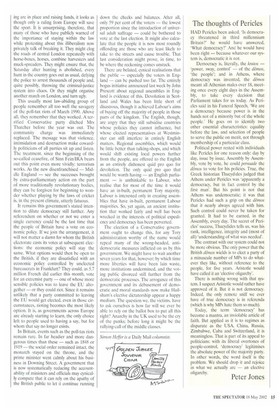The thoughts of Pericles
HAD Pericles been asked, 'Is democracy threatened in third millennium Britain?' he would have answered, 'What democracy?' And he would have been right — because whatever our system is, democratic it is not.
Democracy is, literally, the kratos — 'power, sway, control' — of the demos, 'the people'; and in Athens, where democracy was invented, the demos meant all Athenian males over 18, meeting once every eight days in the Assembly, to take every decision that Parliament takes for us today. As Pericles said in his Funeral Speech, 'We are a democracy because power is in the hands not of a minority but of the whole people.' He goes on to identify two other essential characteristics: equality before the law, and selection of people to serve the public on merit, not through membership of a particular class.
Political power rested with individuals like Pericles for one reason only: day by day, issue by issue, Assembly by Assembly, vote by vote, he could persuade the demos to vote for his policies. True, the Greek historian Thucydides judged that Athens under Pericles was 'apparently a democracy, but in fact control by the first man'. But his point is not that Athens was undemocratic: it was that Pericles had such a grip on the demos that it nearly always agreed with him. Such control could never be taken for granted. It had to be earned, in the Assembly, every day. The secret of Pericles' success, Thucydides tells us, was his rank, intelligence, integrity and (most of all) 'understanding of what was needed'.
The contrast with our system could not be more obvious. The only power that the British demos wields is to elect a party of a minuscule number of MPs to do whatever they like, without reference to the people, for five years. Aristotle would have called it an 'elective oligarchy'.
There is nothing wrong with that system. I suspect Aristotle would rather have approved of it. But it is not democracy. Indeed, the only remote sniff we ever have of. true democracy is in referenda (which is why MPs hate them so much).
Today, the term 'democracy' has become a mantra, an inviolable article of faith. But applied as it is to regimes as disparate as the USA, China, Russia, Zimbabwe, Cuba and Switzerland, it is meaningless. That is part of its appeal to politicians: with its liberal overtones of people-control, 'democracy' legitimises the absolute power of the majority party. In other words, the word itself is the problem. We should drop it and rejoice in what we actually are — an elective
oligarchy. Peter Jones














































































 Previous page
Previous page